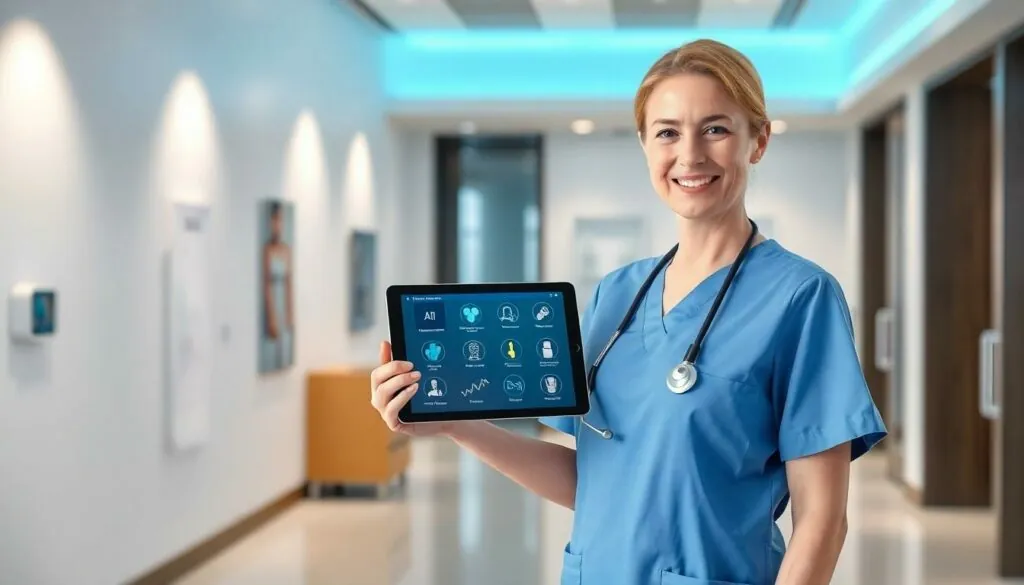In a world where healthcare can feel as chaotic as a cat in a room full of laser pointers, innovative solutions are stepping in to restore some order. Enter ChatGPT, the AI superhero ready to swoop in and save the day. Imagine a virtual assistant that never tires, never needs coffee breaks, and is always up for a chat about your health concerns.
From streamlining patient communication to offering instant medical information, ChatGPT is revolutionizing the way healthcare professionals interact with patients. It’s like having a medical encyclopedia at your fingertips, but without the dust and outdated information. As healthcare continues to evolve, embracing ChatGPT could be the game-changer that makes both patients and providers smile a little wider.
Table of Contents
ToggleUnderstanding ChatGPT
ChatGPT operates as a sophisticated language model powered by artificial intelligence. It generates human-like text responses based on the input it receives. Users benefit from its ability to understand context and provide relevant answers quickly. In healthcare settings, this model proves particularly useful for efficient communication between patients and providers.
Healthcare professionals employ ChatGPT to access a vast array of medical knowledge instantly. It serves as a tool to deliver accurate information on symptoms, treatments, and medications. Medical staff utilize this resource to enhance their decision-making processes and support patient care. Patients find reassurance in receiving reliable information outside of clinical visits.
Customization plays a crucial role in ChatGPT’s effectiveness in healthcare. Developers can adapt the model to align with specific medical fields, enhancing its relevance. This capability allows healthcare organizations to implement tailored solutions that address their unique needs. With training on clinical data, ChatGPT consistently generates contextually appropriate responses.
Integration of ChatGPT into telehealth platforms showcases its versatility. Virtual consultations incorporate this AI model, facilitating seamless communication between patients and practitioners. Through real-time queries and responses, the healthcare experience becomes more accessible and streamlined.
ChatGPT also encourages patient engagement throughout their care journey. Patients can ask questions and receive immediate feedback, reducing anxiety related to medical conditions. Its implementation supports educational initiatives, empowering individuals to understand their health better. Therefore, utilizing ChatGPT in various healthcare applications enhances the overall patient-provider connection significantly.
Applications of ChatGPT in Healthcare

ChatGPT plays a vital role in enhancing various facets of healthcare. Its capabilities range from supporting patient interactions to aiding in medical research.
Patient Interaction and Support
ChatGPT enhances patient interaction by providing immediate responses to inquiries. Patients can engage with the system to clarify medical instructions or learn about symptoms. Providing reliable information improves patient understanding and diminishes anxiety surrounding health issues. Personalized conversations foster a supportive environment, where patients feel valued and empowered. Moreover, its availability reduces wait times typically associated with traditional support channels, enhancing overall patient satisfaction. This innovative approach streamlines communication between patients and healthcare providers while ensuring consistent access to information.
Medical Research Assistance
ChatGPT aids medical professionals in conducting research efficiently. It quickly summarizes studies, extracts relevant data, and compiles literature reviews. Researchers benefit from improved access to insights by utilizing its extensive knowledge base. This tool assists in not just locating information but also in identifying emerging trends in clinical research. By supporting data analysis, it enables informed decision-making in patient care strategies. Therefore, healthcare organizations can leverage ChatGPT to enhance research productivity and foster innovation in clinical practices.
Benefits of Using ChatGPT in Healthcare
ChatGPT offers numerous advantages that enhance healthcare delivery and patient outcomes. Its capabilities promote streamlined communication and foster an engaging healthcare environment.
Improved Efficiency
ChatGPT allows healthcare professionals to access medical information quickly. Instant responses to queries significantly reduce the time spent searching for data. This efficiency streamlines workflows, enabling medical staff to focus more on patient care. By automating routine inquiries, ChatGPT lessens the burden on administrative tasks. It can also assist with appointment scheduling, medication reminders, and follow-up messages, enhancing overall operational efficiency in healthcare settings. Ultimately, these improvements result in better management of time and resources for healthcare providers.
Enhanced Patient Engagement
ChatGPT encourages active patient participation in their healthcare journeys. Patients can ask questions and receive prompt, clear answers that help clarify their concerns. This timely feedback empowers individuals to understand their health conditions better. By fostering an interactive dialogue, ChatGPT nurtures a supportive atmosphere that promotes patient satisfaction. Providing personalized responses helps build trust between patients and healthcare providers. Consequently, a more engaged patient is likelier to adhere to treatment plans and seek regular follow-up care, leading to improved health outcomes.
Challenges and Considerations
Challenges exist in implementing ChatGPT in healthcare. Ethical concerns and accuracy play crucial roles in its effectiveness.
Ethical Concerns
The integration of ChatGPT raises several ethical concerns. Privacy issues emerge as sensitive patient data might get processed without proper safeguards. Moreover, the potential for biased information presents a serious risk, aligning responses based on flawed data can misinform patients or providers. Healthcare professionals must navigate these complexities to maintain trust and uphold ethical standards. Transparency regarding data handling and response generation remains essential to mitigate ethical risks effectively.
Accuracy and Reliability
Accuracy and reliability serve as foundational principles in healthcare applications. Users often rely on ChatGPT for accurate medical information, necessitating precise data and responses. Misleading answers can lead to inappropriate treatment decisions, jeopardizing patient safety. Continuous monitoring and updating of the model ensure it reflects the latest medical guidelines and research findings. Additionally, implementing validation mechanisms enhances the overall reliability of ChatGPT in real-world medical settings.
The integration of ChatGPT in healthcare represents a significant leap toward enhancing patient care and operational efficiency. By streamlining communication and providing instant access to medical knowledge, it empowers both patients and healthcare professionals. This innovative technology not only addresses routine inquiries but also fosters a supportive environment that encourages patient engagement.
While the benefits are substantial, it’s crucial to navigate the associated challenges with care. Ethical considerations and the need for accurate information must remain a priority to ensure trust and safety in medical interactions. As the healthcare landscape evolves, the thoughtful implementation of ChatGPT could redefine patient-provider relationships and improve health outcomes for all.




